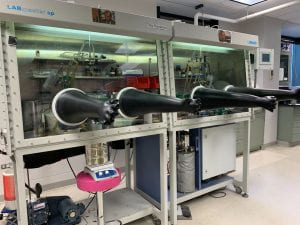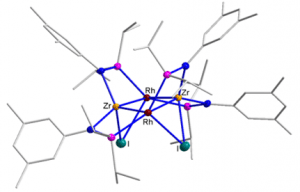This fall I used the STEP Fellowship to fund my research, working in Dr. Christine Thomas’s research group, in Newman Wolfrom Laboratory. Over the semester I continued to work on the project that I began in the summer following the summer of my sophomore year: the synthesis of zirconium/rhodium heterobimetallic complexes. Zirconium/cobalt heterobimetallic comple xes have been studied in great detail in the Thomas Research Group, however their zirconium/rhodium analogs have not been studied with the same depth. My goal has been to synthesize zirconium/rhodium analogs of reported zirconium/cobalt complexes in order to compare molecular structure and reactivity. As a member of the Thomas Research Group, I have synthesized several bimetallic complexes and have been exposed to graduate inorganic chemistry research and current objectives to advance sustainable development in chemistry.
xes have been studied in great detail in the Thomas Research Group, however their zirconium/rhodium analogs have not been studied with the same depth. My goal has been to synthesize zirconium/rhodium analogs of reported zirconium/cobalt complexes in order to compare molecular structure and reactivity. As a member of the Thomas Research Group, I have synthesized several bimetallic complexes and have been exposed to graduate inorganic chemistry research and current objectives to advance sustainable development in chemistry.
Conducting research this fall has allowed me to continue to channel my passion for synthetic chemistry and has reaffirmed my interest in chemistry as a subject and possible career path, after my interest in chemistry peaked when taking General Chemistry during my freshman year. Working in Dr. Thomas’s Laboratory, which focuses on catalyst development helped me recognize the need for sustainable development in chemical research and industry. Prior to the beginning of my research, I wasn’t aware that many catalysts used in organic synthesis required rare expensive metals mined in select locations around the globe. Through research, I have been exposed to a movement within chemical research that strives to develop catalysts comprised of cheap abundant metals, in order to make chemical synthesis and industry more sustainable.
Due to the outbreak of COVID-19 I have had access to less time in the laboratory, as our research group adopted a research shift schedule to reduce lab capacity. Since returning to the laboratory this fall, I have adjusted to a strict schedule, only working for two four-hour shifts per week. In the spring I consistently worked 20+ hours per week; this change has forced me to diligently plan out experiments and be more efficient in the laboratory. Despite this I have still been able to conduct meaningful research, reaffirming my desire to continue in an inorganic chemistry career.
Aside from having a solid foundation in wet-lab skills, I also must be able to effectively present findings to broad audiences. In order to develop my own communication skills I participated in Ohio State’s 3 Minute Thesis Competition this fall. In this event I presented the significance of my research to business, psychology, biology, economics, engineering, and political science majors. This presented a new challenge because I had to explain my research assuming my audience does not know any chemistry. Through this experience I displayed my knowledge of fundamental chemical concepts and their application beyond the field of chemistry as well as the research I had conducted this semester. Had I not been able to conduct research this fall I would not have been able to participate in this event.
The STEP fellowship finally as allowed me to continue my research where I had left off this past spring. This semester I have fully characterized several ZrIV/RhI complexes and synthesized a rare ZrIV/Rh-I complex potentially capable of small molecule activation and catalysis (pictured below). Through the characterization of these complexes, I have nearly completed my project as assigned to me in the summer following my sophomore year.

Working in a graduate research lab has instilled in me a desire to attend graduate school. As a member of Dr. Thomas’s laboratory, I have become experienced with numerous characterization methods and have developed necessary critical thinking and wet lab skills necessary to excel in a career in chemistry. My undergraduate research work, guided by Dr. Thomas’s mentorship will (hopefully) lead to my acceptance at several graduate PhD programs, where I intend to continue chemical research, in pursuit of eventually becoming a university research professor.
